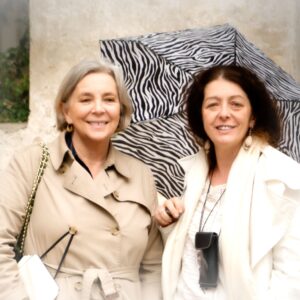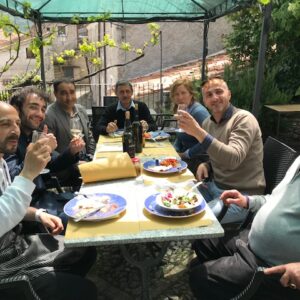I could not imagine a more difficult task than to revisit the places that inspired his commitment to learn Italian, to study with Luigi Bonaffini in New York to decipher the Lancianese dialect well enough to translate his cousins’ poetry; or to stay with the cousins we love and first met on our Sicilian honeymoon; or my cousins in Calabria where we had traveled with my parents. Returning to these places – Abruzzo, Calabria, Sicily, the south and the deeper south– filled me with dread.
As many widows know, we look for signs – be they from a higher power, the universe, our spouses or just serendipity, so when I received yet another notice about the two-week residential Italian Diaspora program conducted by the Department of the Humanities at the University of Calabria, I scrambled to find a place at the table.
I told myself, how inviting would it be to take up residence for a week or two in one of the most beautifully preserved borghi in Italy, namely Morano Calabro and the enchanting agriturismo Torre de Albidona that overlooks the Ionian Sea?
From these locales, I might channel my memory, ancestral myths, tales of my grandmother, grandfather, or my parents who may have emigrated– if not from the region of Calabria, then another region of Italy or from another country. The distance from home might give me the space to wander with grief tucked away for a while.
Designed, organized and initiated by Professor Margherita Ganeri, a professor of Contemporary Italian Literature at the University of Calabria in Rende, Cosenza, the program was described as “dedicated to Writing in Cultural Heritage and Memory.”Mornings were dedicated to writing or to presentations, followed by a wide array of local foods for lunch, and an excursion every afternoon.

About 20-25 people of various ages and backgrounds gathered in a small room with windows opened to the Pollino Mountains: poets, scholars, artists, anthropologists, publishers, a rabbi, lawyers, actuaries, clerks, social workers, therapists, a performance artist delivered a bewitching assortment of stories– about ancestors, natives and visitors – yourself, your family and a place that rarely appears on a travel itinerary.
Enhancing the morning sessions were speakers, including a poet, publisher, anthropologist, performance artist, translator and poet. Just as impressive were the day trips to Albidona proper for instance, a town perched high above Morano Calabro where Mayor Filomena Di Palma welcomed us with a short history of the town followed by a procession in the streets complete with music on zamponi (bagpipes) and tambourines, and dancing and a banquet of locally-made specialties from sausages, to olives to cheeses and taralli. It’s no small wonder that celebrity chef, television host, author, and restaurateur, Lidia Bastianich has turned her gaze to writing about the food from Calabria. The southern regions are having a bit of a renaissance so it would be great to arrive before the hordes.
Books to read prior to your visit might include: Carlo Levi’s Christ Stopped at Eboli, which will likely be discussed and referred to during the Italian Diaspora Studies program. The latest books that showcase Calabria and Basilicata are written by young Italian American female authors: Juliet Grames, The Seven or Eight Lives of Stella Fortuna; and Helene Stapinski’s Murder in Matera.
The Italian Diaspora is little spoken of. In fact, hardly anyone thinks of Italians and the diaspora, but more commonly, of the Jewish or African-American Diasporas. Yet this group of 25 participants, Italians and/or hyphenated Italians and non-Italians came together to discover, learn, explore, divine their radici, roots, and transform those discoveries into novels, poems, memoirs, drawings, watercolors and stories. Surrounded by breathtaking Calabrese scenery, and hearing, even if not speaking in local dialects or modern Italian, are just some of the elements that made this experience so gratifying and enlightening—as some of the participants attested.
Three of my grandparents came from Calabria and ironically, it is the region I have explored the least as a travel writer. I knew a limited amount about the region, have family in Reggio, traveled the coast to Locri and the places in between that felt so very Greek to me, and up to Aspromonte and La Scylla, but not Pollino National Park, not Cosenza, the province of my paternal grandmother whom I most resemble.
The seminal experience begins with the writing sessions during the first week. It was led by American Book award-winning poet, Maria Mazziotti Gillan, who has written 23 books of poetry and is the author of Writing Poetry to Save Your Life. Gillan is an extraordinary force in the Italian American literary community and is known as a legendary teacher with an uncanny ability to trigger people’s instincts to tell their own stories. Participants shared their stories: what they knew, what they surmised. They arrived to demystify the myths, to get a feel for the place, to understand themselves. One tale after another revealed the complexity of the Italian Diaspora.
Gillan would preface the sessions with examples and short lectures followed by a series of prompts designed to tap intuition rather than intellect and poetry skills. Fueled by participants’ deep memory sources and storytelling, no participant left without at least a poem, short story or lead for a future project.
Among the speakers was Vito Teti, Professor of Ethnology at the Faculty of Humanities of Calabria University, where he founded and directs the Center of Mediterranean Anthropology. He led a round table discussion, touching on the dynamics of immigration, migration, its effects on the land and the people who are left behind. Thanks to Guernica Editions, Teti’s book, Stones into Bread, was recently translated and published in English. The director of the publishing house, Connie Guzzo MacParland, who was born in Calabria, conducted a seminar during the second week of the program on how to prepare a manuscript for publication. While her talk covered publishing practicalities, it was her personal journey from immigrant to entrepreneur, author and publisher that most impressed participants.
Our trip to Aliano, where Carlo Levi was exiled much of the time, attracted La Repubblica reporter Paola Zanuttini to walk with us and reinvigorate Carlo Levi’s story as depicted in the book and film of the same name, Christ Stopped at Eboli.
Israel-based Dina Tsoar joined the group as she was in contact with Rabbi Barbara Aiello, who was among the riveting speakers who presented a piece of Calabrian history many of us never knew – its Jewish heritage – and as it turns out, for some, our personal heritage. Tsoar identifies as Jewish but after 50 years of living in Israel, she decided to track her father’s Calabrese origins, embracing them as her own. Aiello is the first female rabbi in Italy, as well as Italy’s first non-Orthodox rabbi. She returned to her own roots in Calabria (her mother was from Sicily), where she has since opened a synagogue in Serrastretta, Sinagoga Ner Tamid Del Sud – The Eternal Light of South Italy, the first and only active synagogue in Calabria (south Italy) to open in the past 500 years (since the time of the Inquisition). The community is dedicated to welcoming “b’nei anusim” (the children of the forced ones – forced to convert) to reclaim their Jewish roots.
Former attorney, New Jersey-based Mary D’Agostino, who was born near Lago Maggiore, said the Italian Diaspora Studies course helped place her family’s emigration to America in a more encompassing historical context. Another woman told the story of attending her father’s funeral and seeing a man who was the twin image of her father, only to learn that her father had a second family in Italy and he was the son, her new half-brother. Others still told stories of Canadian internment during World War II.
Accommodations were divided between the town of Morano Calabro described by the Touring Club Italiano as among the “Borghi più belli d’Italia” and “Bandiera arancione” at the impeccably run, comfortable and warm Hotel San Domenico; while workshops took place in an albergo diffuso called “Il Nibbio” and in the second week at the beautifully located agriturismo, Torre Albidona just above the Ionian Sea.

During the first week we stayed at the Villa San Domenico or Il Nibbio, the latter an albergo diffuso, which is an Italian invention developed in the 1980s to bolster the economies of small, beautiful towns. At the Villa San Domenico where la spuma on the cappuccino arrives perfect in china cups each morning at a table set for six or four in front of a fireplace that seems to always be warming us on brisk spring mornings, or after dinners as the night’s cloak covers the nearby valleys, towns and mountains vanish into the oncoming night. The owner, Tonino, the cook and manager, Ukrainian Tanya and her son, Roman, are the team behind this seamlessly run property of just 12 rooms.
Workshops, lunch and aperitivi took place at Il Nibbio that includes the Center for Natural Studies of Mount Pollino, a decentralized museum “scattered” in a series of newly-refurbished buildings that used to be dilapidated old houses in Morano Calabro, a small town in Pollino National Park, listed among the “Borghi più belli d’Italia” (“The most beautiful villages of Italy”) and honored in 2003 with the Orange Flag – a recognition of touristic and environmental value conferred by the Touring Club of Italy.
The second week was spent in Albidona (CS), on the Ionian Coast, with several planned field trips in the surrounding areas of Calabria and Lucania, including a daytrip to Matera, one of this year’s European Capitals of Culture 2019. “Masseria di Torre Albidona”, an ecological farm of about 80 hectares, on a panoramic setting overlooking the Ionian Sea, has its own private beach and is surrounded by a pine forest. The rooms are located in ancient, beautifully restored farmhouses.
A century ago, Calabria may have engendered prejudice, even scorn – there was the shame my grandparents carried across the Atlantic as they were too hungry to stay home; the dialect they would call a language was denigrated on both sides of the Atlantic; the derisive nickname of terrone prevailed.For me, it was up-close and personal. We were not Italian, we were and are a polyglot of cultures including Greek, Middle Eastern, African, and lately I discovered in my case, Jewish.
After immersing myself in the two-week Italian Diaspora Studies program I returned home with a touch of pride around my shoulders for having made the trip without my beloved and finding an aspect of my Calabrian self that can only strengthen who I am.
Information:
Registration is opened for next year’s session scheduled for May 18-31, 2020; a perfect season to travel to this part of Italy when spring is in full bloom. The sessions will be dedicated to writing and visual arts such as photography, watercolors; and an Italian conversation class has been added to the mix. If you don’t know much about southern Italy, this is the trip for you.
https://italiandiasporastudies.com












